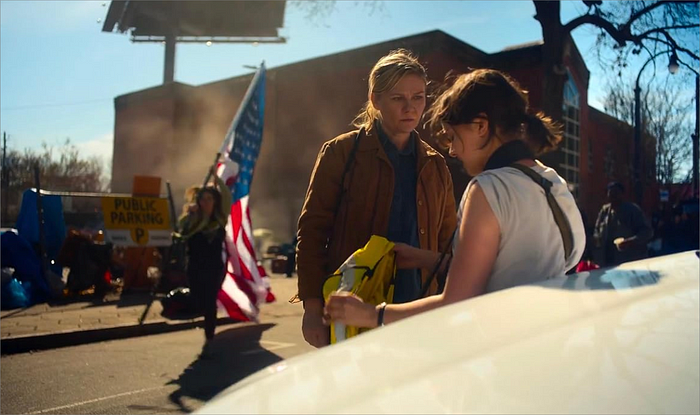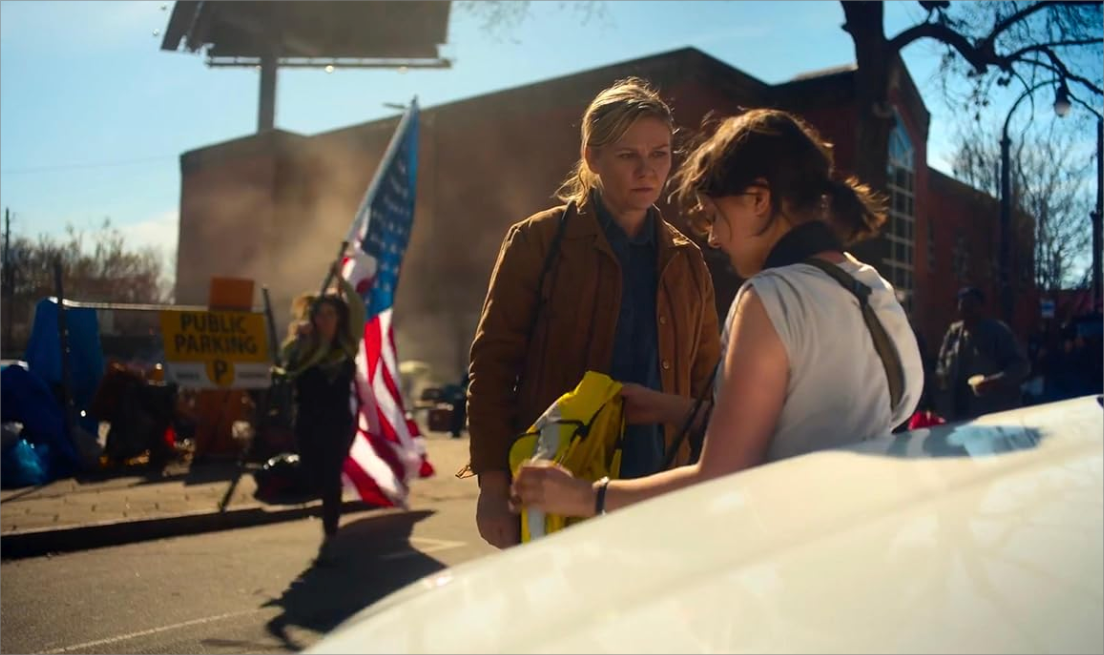I finally braced myself to see Alex Garland’s Civil War earlier this month, unable to watch in more than 10 minute chunks, and so found myself flipping between fictional scenes of American carnage and real-world assaults on the Holiday Inn in Rotherham. I learned an unpleasant lesson

Burning bin at Holiday Inn Express in Rotherham, Aug 5 2024, screengrab from Sky News
I finally braced myself to see Alex Garland’s Civil War earlier this month, unable to watch in more than 10 minute chunks, and so found myself flipping between fictional scenes of American carnage and real-world assaults on the Holiday Inn in Rotherham. I found both compelling but hard to watch.
I realised that what I saw in Civil War wasn’t what most other people seemed to see. It follows four (and for while six) journalists through an America in the midst of war between at least two groups, culminating in the journalists following one faction into the White House in what appears to be the final moments of the war. The reasons for the conflict and for the state-level alliances are never made clear or explored.
Although superficially it’s about journalists covering a war, it’s really about the war itself, and while reviewers have tended to bemoan the lack of hack-like things — most notably discussion among the four journalists about what caused the war, that is exactly what journalists would do by this point in a story — they might discuss how the war might end, but Garland rightly focuses on what that means for the journalists themselves, who of course obsess about scoops, money shots and that critical knack of being in the right place at the right time.

What I see in the movie is this: From the opening scene, with the flag-carrying suicide bomber running into a crowd of people waiting for a water truck, Garland focuses on the dehumanised nature of the conflict. He focuses on the conventions of war, and essentially demonstrates methodically that in this conflict there are none. This is as murderous, bloody, savage and inhuman as any other war — in Serbia, in Rwanda, in Somalia, in El Salvador, in Myanmar, in Ukraine, in Syria, in Gaza, you name it.
This is Americans killing each other in the most brutal ways on American soil, not really caring who they are, even whether they’re on the same side. There is no code of honour, no Geneva Convention, no taking of prisoners, no distinguishing between civilian and combatant. The first shots we witness are from khaki-clad fighters peppering an opponent trying to hide behind a pillar. When the group the journalists are following prevail, they shoot dead an incapacitated soldier and execute their prisoners with an anti-aircraft gun.
The idea of side is constantly derided by participants. One sniper mocks Wagner Moura’s character when he asks them who he’s shooting at. “Someone’s trying to kill us. We’re trying to kill them.” When Jesse Plemons’ character, the most bloodthirsty and indiscriminate of all those the journalists encounter, asks where each of them comes from, the answers don’t seem to matter. What type of American are you, he asks, inscrutable behind his red sunglasses, without ever seeming to know what type he is looking for.
Garland is saying: we are no better; Americans are no better, than anyone else. We pretend we are, but when the last vestiges of democratic rule have gone — and many have already gone — this is how we will treat each other, already are treating each other.

From the opening suicide bomb to the (spoiler alert) Saddam-like, Gaddafiesque, murder of the president lying on the floor of the Oval Office, Garland is saying: this is where we’re at. It doesn’t matter how we got here; we’re already here. He used journalists as the medium because as individuals they were observers to the tragedy, hungry to see the worst of it, hungry for the rush, but they’re useful idiots in portraying his message.
We journalists might be occasionally tender to one another, and allow our feelings to sometimes protrude, but then we, like the stories, move on. Kirsten Dunst’s Lee Miller, the war photographer we follow throughout the movie, dies on the carpet protecting her protégée, but neither her colleague/friend, or the protégée, stop to check for a pulse. They move on, drunk by the high of being in the right place at the right time. The character arcs of Jessie and Lee — the ‘narrative’ of the story — predictably cross over as one becomes desensitised to war enough to photograph it, while the other goes in the opposite direction. They are us.
Garland is saying: journalists are shits, have to be shits to do their job, but so, under the right conditions, are we all.
This is not a tale about humanity or the triumph of the spirit, or a heartfelt paean to the lost era of journalism. There is no humanity here, Garland is saying, so why should I waste time pretending that there’s someone to care about, a dog to save, or a kid, that usually works as a salve to our conscience in such movies — “the whole world froze over/blew up/was destroyed by aliens but Timmy the Dog was safe!” Garland is saying: this is the reductio ad absurdum of all our efforts to put allegiance to party, cause and power over country. There is no magic brake that somehow stops America — or any country — from falling into civil war.
I know I’m sailing against the wind here. I’ve seen reviews like this one, which go the other way: “(Cailee Spaeny’s character Jesse)’s decision to keep shooting through Lee’s sacrificial death becomes Civil War’s final insistence that there is a unique nobility to this profession. They care about the truth; it’s why Jessie captures the president’s extrajudicial killing.” I am happy to debate the point, but I just don’t buy that. It’s true that the profession has its better moments, but the idea that somehow taking a photo of the president’s pleading last words and ignominious death was somehow noble, or a resolution of sorts, somehow making worthwhile the deaths of half of the journalists who made the trip, is to misunderstand, I believe, what Garland was attempting to say.
It was instead the manner of the president’s death (and all the other combatant and non-combatant deaths), and the fact that the soldiers know they’re being photographed doing it, but don’t care, and even enjoy it, that was Garland’s point. The end of one American dictatorship ended like any Third World uprising or coup. That the journalists felt no danger, no fear that the soldiers may murder them to conceal their assassination, is the message. Take any other decent journalist flick — Killing Fields, Year of Living Dangerously, Under Fire, Salvador, I could go on — and the narrative is built around the idea that journalists stumble upon a warcrime and risk their lives to get the story out. Nothing like that happens here: it is Abu Ghraib-level selfies, confident there will be no repercussions.

Garland hasn’t made a masterpiece, though time may prove me wrong on that. I don’t think that was particularly his intent. This is polemic more than poetry. I don’t think he was interested in, or wanted us to be interested in, the characters, beyond making them substantial enough to add heft to the film’s credibility (and the performances are excellent). As a journalist I have few quibbles with how the profession is portrayed, though I would have expected to see more calls from editors, filing stories, recording expenses. Garland captured the heady mix of gut-dropping fear and by hysterical relief as the journalists seek out, and then try to extricate themselves from, fiefdoms controlled by unpredictable men and women with guns.
He presented the battle scenes as journalist reportage to show us how these things — fantasies, fears, nightmares, our daily lives — may play out when we go down this road, without us getting caught up too much in the outcome. Garland shows us how quickly the process brutalizes us, squaring the circle around our own throats. Dunst’s character talks about how she thought that her career covering foreign wars would send a warning home: “Don’t do this. But here we are.”
This is Garland’s message. Journalism plays a useful role here as a vehicle — once America (the West) thought so highly of itself that it paid individuals to risk their lives covering dangerous power plays in dangerous parts of the world, so we could wring our hands and remind ourselves at least our values were intact. No more. Garland is saying those journalists serve no purpose anymore, because we are just a blockaded door in the Capito away from the exact same power play. We’ve become the dangerous part of the world, and we don’t yet see it.
